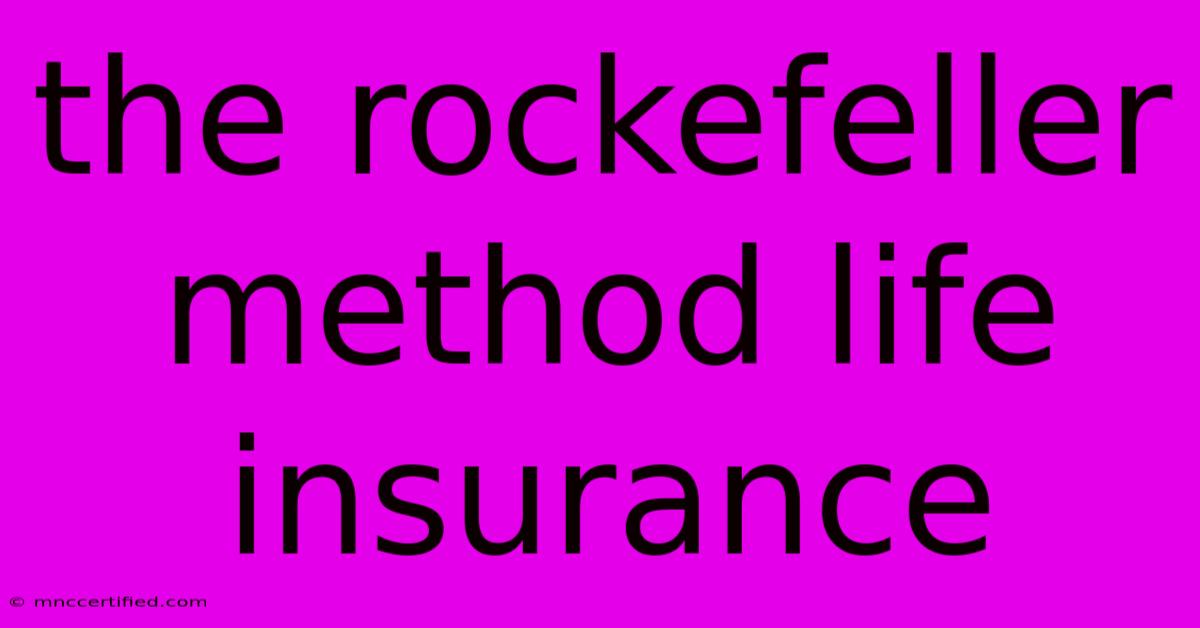The Rockefeller Method Life Insurance

Table of Contents
The Rockefeller Method: Unlocking Financial Security Through Life Insurance
The Rockefeller Method, a life insurance strategy named after the iconic industrialist family, has gained popularity for its potential to build wealth and secure financial stability. This method, often associated with whole life insurance, centers around using the cash value component of the policy to accumulate wealth over time.
While the method is often portrayed as a foolproof path to financial freedom, it's crucial to understand its nuances and potential drawbacks before making any decisions.
Understanding the Fundamentals:
The Rockefeller Method revolves around the idea of leveraging the cash value within a whole life insurance policy. Whole life insurance offers a death benefit, guaranteeing a payout to beneficiaries upon your passing. However, it also includes a cash value component, which accumulates over time as you pay premiums. This cash value can be accessed through borrowing against the policy or withdrawing funds.
How the Rockefeller Method Works:
-
Policy Selection: The cornerstone of this strategy is choosing a whole life insurance policy with a guaranteed minimum rate of return on the cash value.
-
Premium Payments: Regularly paying premiums helps build cash value, which grows over time.
-
Cash Value Growth: As the cash value accumulates, it earns interest, potentially exceeding the returns of other investment vehicles.
-
Leveraging Cash Value: This is where the Rockefeller Method truly shines. You can use the accumulated cash value for various purposes:
- Borrowing for investments: Taking out a loan against your policy allows you to invest in assets with higher potential returns, further accelerating wealth accumulation.
- Financial emergencies: The cash value acts as a safety net, providing access to funds during unexpected life events.
- Retirement income: The accumulated cash value can be accessed during retirement, supplementing other income sources.
Benefits of the Rockefeller Method:
- Tax Advantages: Interest earned on the cash value is typically tax-deferred, meaning you pay taxes only when you withdraw funds.
- Guaranteed Returns: The cash value component of whole life insurance often has a guaranteed minimum rate of return, offering a level of stability compared to stock market investments.
- Long-Term Growth: The compound interest effect allows cash value to grow exponentially over time, particularly if you use the borrowing strategy.
- Legacy Building: Whole life insurance offers a death benefit, leaving a financial legacy for loved ones after your passing.
Potential Drawbacks and Considerations:
- Higher Premiums: Whole life insurance policies generally come with higher premiums than term life insurance.
- Investment Risks: While cash value offers stability, it typically yields lower returns compared to stock market investments.
- Borrowing Costs: Borrowing against your policy can incur interest charges, impacting the overall return on your investment.
- Complexity: Understanding and implementing the Rockefeller Method requires careful planning and financial expertise.
Is the Rockefeller Method Right for You?
The effectiveness of the Rockefeller Method depends on several factors, including:
- Financial goals: Do you prioritize long-term wealth accumulation or immediate financial protection?
- Risk tolerance: Are you comfortable with potentially lower returns but a higher level of security?
- Financial knowledge and resources: Do you have the understanding and resources to implement a complex strategy?
Before implementing the Rockefeller Method, consider these steps:
- Consult a Financial Advisor: Seek expert advice from a qualified professional to tailor the method to your specific needs and risk tolerance.
- Compare Policy Options: Research and compare different whole life insurance policies, evaluating premiums, cash value growth potential, and guarantees.
- Understand the Fine Print: Thoroughly read the policy documents and understand the terms, fees, and potential limitations.
- Develop a Comprehensive Plan: Create a detailed financial plan incorporating the Rockefeller Method, considering your long-term goals and potential risks.
Conclusion:
The Rockefeller Method can be a valuable strategy for building wealth and achieving financial security, but it's not a one-size-fits-all solution. Carefully weigh the benefits and drawbacks, seek professional guidance, and develop a comprehensive plan to ensure this method aligns with your individual financial aspirations.

Thank you for visiting our website wich cover about The Rockefeller Method Life Insurance. We hope the information provided has been useful to you. Feel free to contact us if you have any questions or need further assistance. See you next time and dont miss to bookmark.
Featured Posts
-
Does A Tree Service Need To Be Bonded
Nov 10, 2024
-
Williams Back Team Name Vs Wright State
Nov 10, 2024
-
Crystal Palace Vs Fulham Live Stream Guide
Nov 10, 2024
-
Gauff Claims Wta Title Beats Zheng
Nov 10, 2024
-
Liverpool Vs Aston Villa Live Premier League Stream
Nov 10, 2024